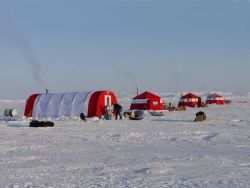Scientists and explorers working together : Catlin Arctic Survey number three is on its way…
Published on 23.03.2011 - General Info
This is the third time that the Catlin Arctic Survey is back to the arctic geographical zones. This expedition is a unique collaboration between scientists and explorers to undertake field research in the Arctic.
The first time the Catlin Arctic Survey was on the field took place in 2009 : led by Pen Hadow, the team had the project of taking continuous and detailed measurements of both the snow and ice layers along their route. But they did not complete their goal : when the trio was still 490 kilometres from the North Pole, and after a 73-day trek, Pen Hadow, Ann Daniels and Martin Hartley threw in the towel. Two Twin Otters were needed for recovering them... (See our first coverage).
The second time the CAS was working on the ice took place last year, and still was led by british explorer Pen Hadow. That time, the expedition goal was focusing on the effects that carbon dioxide is having on the Arctic Ocean. The aim was to cover around 500 km on the sea-ice. (See our second coverage).
This spring the CAS is ont the move again. Here are some excerpts from its press dossier : "While there is much debate about our changing environment, one thing is absolutely clear: we need more factual information. The Catlin Arctic Survey enables the monitoring, measuring and collection of information to improve scientific understanding of the processes involved in, and the impacts of, climate change. On this third Catlin Arctic Survey, scientists and explorers are examining the surface layers of the Arctic Ocean. They are researching how changes within the seawater beneath the floating sea ice may be affecting powerful ocean currents that influence prevailing climate and weather patterns worldwide. Increased levels of freshwater from melting sea ice, ice caps and glaciers, and warming Arctic waters, may radically unbalance the processes which sustain the most significant of these currents: what is known as thermohaline circulation."
" The Catlin Arctic Survey is focused on the impact of this increased freshening of the Arctic Ocean’s water, and the potential changes this could cause to Earth’s global ocean circulation system. In parallel, scientists from the US, UK and Canada are conducting experiments at a unique research station on the frozen Arctic Ocean with the support of experienced polar explorers and guides. ..."











